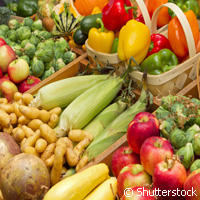Eat your fruits and veggies, protect your heart
The benefits of eating fruit and vegetables have been underlined once again as UK researchers say they can protect people from the most common form of heart disease - and one of the leading causes of death - in the EU. The research was funded in part by the EPIC ('European prospective investigation into cancer, chronic diseases, nutrition and lifestyle') project, which was backed by almost EUR 1 million under the 'Research for policy support' Activity of the EU's Sixth Framework Programme (FP6). The study was recently presented in the European Heart Journal. Scientists at the University of Oxford found that people who ate at least 8 portions of fruit and vegetables a day had a 22% lower risk of dying from ischaemic heart disease (IHD) than people who consumed fewer than 3 portions a day. A portion weighed 80 grams, equal to a small banana, a medium apple, or a small carrot. IHD reduces blood supply to the heart, and can cause angina, chest pains and heart attacks. The researchers evaluated data from the European Prospective Investigation into Cancer and Nutrition (EPIC) involving over 300,000 people in 8 different European countries, with 1,636 deaths from IHD. Dr Francesca Crowe from the university's Cancer Epidemiology Unit said the study showed 'a 4% reduced risk of dying from IHD for each additional portion of fruit and vegetables consumed above the lowest intake of two portions'. Hence, 'the risk of a fatal IHD for someone eating five portions of fruit and vegetables a day would be 4% lower compared to someone consuming four portions a day, and so on up to eight portions or more'. The researchers made allowances for confounding factors such as differences in lifestyles and eating habits. However, they acknowledged that the study could be limited by errors in measuring people's fruit and vegetable intake correctly as well as other aspects of their diet. In addition, the study had a higher proportion of women, which might not accurately reflect the European population. Commenting on the results of the study, Dr Crowe said: 'The main message from this analysis is that, in this study, people who consumed more fruits and vegetables had a lower risk of dying from IHD. However, we need to be cautious in our interpretation of the results because we are unsure whether the association between fruit and vegetable intake and risk of IHD is due to some other component of diet or lifestyle.' Further research could help answer some of these questions, she pointed out. 'If we could understand, by means of well-designed intervention studies, the biological mechanisms that could underlie the association between fruits and vegetables and IHD, this might help to determine whether or not the relation between fruit and vegetables with IHD risk is causal.' In an accompanying editorial, Professor Sir Michael Marmot, Director of the University College London's (UCL) International Institute for Society and Health, head of the UCL Department of Epidemiology and Public Health, and Chairman of the Commission on Social Determinants of Health in the UK, agreed that it was difficult to reach firm conclusions from these results. But he noted that the research was nonetheless significant. 'Cardiovascular disease is the most common cause of death,' he wrote. 'A reduction of 22% is huge. But...this reduction in mortality comes with consumption of eight portions a day. Such a high consumption was found in only 18% of the men and women. There would need to be big shift in dietary patterns to achieve this healthy consumption of eight portions a day,' but 'moving to a diet that emphasises fruit and vegetables is of great importance to public health.'For more information, please visit: EPIC:http://epic.iarc.fr/University of Oxford:http://www.ox.ac.uk/European Heart Journal:http://eurheartj.oxfordjournals.org/
Countries
United Kingdom

